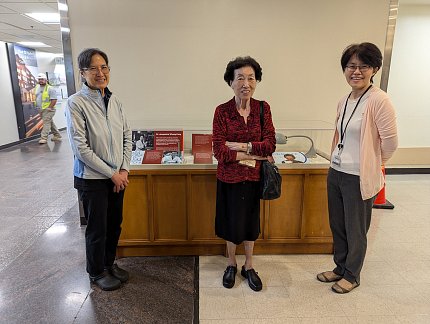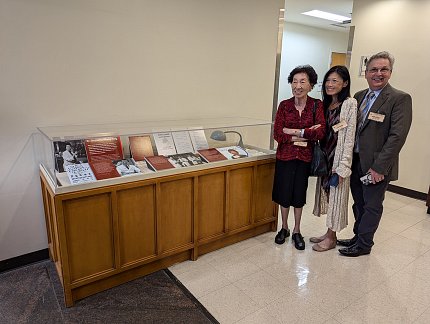Former NCI Lab Chief Visits Display Featuring Her Work

On Oct. 3, Dr. Jacqueline Jia-Kang Whang-Peng visited the new display in the Clinical Center featuring her work and life and reflected on more than three decades as a researcher at the National Cancer Institute (NCI).
Accompanied by family members, NIH scientists, former colleagues and the curatorial staff of the Office of NIH History and Stetten Museum who created the display, Whang-Peng remembered her time as chief of NCI’s cytogenetic oncology section from 1960 to 1994. An expert in cytogenetics—the study of chromosomes and their effect on cell behavior—she expanded scientific understanding of many cancers.
In 1960, the role of chromosome (gene) changes as a cause of cancer was not recognized because no established technique existed yet for observing chromosome changes in the laboratory. Whang-Peng and her mentor Dr. Joe Hin Tjio developed the technique to prepare mammalian cells for chromosomal research, observing and analyzing the chromosomes inside the cell. Their 1962 paper described a “squash” method and an “air-dry” method. One of her first related efforts was to study leukemia in tissue culture.
Whang-Peng quickly became the primary consultant on chromosomal abnormalities and cancer at NIH and collaborated with scientists within NCI—helping to research many different cancers—as well as researchers across NIH and outside the agency.
In 1972, Whang-Peng became one of the first two women to win the Arthur S. Flemming Award, which honors outstanding young federal workers. She was recognized for her chromosomal and leukemia research.

Whang-Peng was born in mainland China in 1932, but in 1949 her family fled to Taiwan to escape the Chinese civil war. She was the first woman trained in surgery at National Taiwan University’s Medical College, earning her M.D. in 1956, and the first female surgeon from Taiwan to do an internship in the United States. During her internship at Boston’s New England Hospital, the plight of people with cancer inspired her to change her focus, leading to her career at NCI.
After retiring from an over three-decade career at NIH, Whang-Peng returned to Taiwan. A human dynamo, she has had a fruitful second career establishing research programs, training investigators and conducting public education in cancer prevention and treatment. She is now in her early 90s and still working.
In 2008, Whang-Peng added the L’Oréal-UNESCO Award to her long list of honors. She was the first Taiwanese national to receive the award, which celebrates the accomplishments of women scientists.
The display about Whang-Peng is located on the first floor of the NIH Clinical Center, near the entrance to the Bioethics Office.
